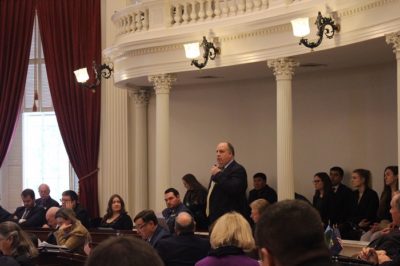
PAID FAMILY LEAVE: Vermont lawmakers are currently advancing a bill to create a statewide family and medical leave program, but the cost projections continue to soar.
Mostly Democrat lawmakers in the House Ways and Means Committee this week advanced a paid family and medical leave insurance program that is both larger in scope and cost than the program put forth by Republican Gov. Phil Scott.
On Tuesday, committee members voted 8-4 to advance H.66, an act relating to paid family and medical leave insurance. Discussions ahead of the vote centered on how much the program would cost and how to make up the difference if the estimates are off base.
What if cost estimates are too low?
Rep. Scott Beck, R-St. Johnsbury, was the only Republican voting in favor of the bill. However, he asked important questions about cost, including who will cover expenses if costs go significantly higher than the initial estimates.

Rep. Scott Beck, R-St. Johnsbury
“Do we just hear loud screams from Appropriations [the House Appropriations Committee, which analyzes funding requirements for legislation], or does the rate that people pay adjust to cover that cost?” Beck said.
Patrick Titterton, a fiscal analyst for the state’s Joint Fiscal Office, was on hand to take the question.
According to data from the JFO slide presentation, costs to run the program are estimated at around $117.6 million for fiscal year 2027, which is the first year that the benefits would become available to the public. Those costs include the estimated payouts from the program plus ongoing administration costs. Gov. Scott announced a voluntary program that would cover 60 percent of an employee’s income for up to six weeks, pending that there’s a qualifying event.
Titterton clarified that implementation costs are a separate matter.
“So right now the rate is just meant to cover the ongoing costs, so it’s not meant to cover implementation costs,” he said. “Theoretically, you could increase the rate if you wanted to, to collect for unforeseen costs. The other option would be … loud screams from Appropriations.”
Rep. James Masland, D-Thetford, said he stands by efforts to deliver the program despite the costs.
“I mean it’s expensive, we know that,” Masland said. “… Assuming we do it, we know what we are doing and why we are doing it, and we’ll see what the Senate does.”
No ‘experience rating system’
Rep. Emilie Kornheiser, D-Brattleboro, the chair of the committee, commented that she is against the program implementing an “experience-rating” system — which is when insurance companies make adjustments to the rates users pay according to the frequency that the insurance is utilized.
Kornheiser suggested that such systems may inadvertently incentivize companies to under-utilize the program when someone may really need more time off.
“It’s a place in public policy where I feel less comfortable having sort of an employer-by-employer experience rating happening, because I think it might create some perverse incentives for folks,” Kornheiser said.
“I don’t think I’ve worked anywhere where I felt supported to take the full leave I needed, because there’s always like the pressure of the deadline,” Kornheiser added.
Some lawmakers suggested that doing the system without changing experience ratings and changing costs will ultimately make the program more predictable for taxpayers.
Beck contested this notion. He suggested that the accuracy of initial cost estimates will be a key factor.
“The only thing that determines stability is whether the person projecting what the costs are … accurately reflect what the costs are going to be,” he said.
Beck pointed out that policies and estimates coming from industry professionals are always going to be the most accurate the lawmakers can get.
“I’m inclined to think that insurance professionals who have been doing this kind of work for decades will have a better idea of what the usage rate, what this is all going to cost, than the treasurer’s [estimates], or anybody else who’s just never done this before,” he said.
Rep. Carl Demrow, D-Corinth, suggested that various state professionals have provided the lawmakers with relatively sound cost estimates based on similar programs implemented in other states.
“We’re not really reinventing the wheel here, we’re sort of taking pieces from other states’ programs,” he said.
On the other hand, Rep. Carolyn Branagan, R-Franklin, agreed with Beck that they should be following industry policy and direction more than this bill currently does.
“Scott and I agree … on whether the government does it better or individual businesses. That’s a fundamental thing on which I will not change,” she said.
The March 14 meeting of the committee can be viewed online here.
Michael Bielawski is a reporter for True North. Send him news tips at bielawski82@yahoo.com and follow him on Twitter @TrueNorthMikeB.



A page taken from Nancy Pelosi’s playbook, we pass the legislation and afterward, you can read it. The costs are irrelevant and not important because we steal your money, invest it in the companies and non-profits benefiting from our legislation. They, in turn, fund our politcal campaings and grease our palms for funding them with your money. See how it works?
Is there any one single aspect of our lives that these Progressive busy bodies don’t feel a burning desire to control? Is this nanny government really what the people of Vermont desire? For decades I have challenged the likes of Bernie Sanders……….if you want to run a business, start your own and show us how it is done. You can offer whatever pay and benefits you feel are appropriate, but, no, this type of individual hasn’t got the guts, brains, or drive to do that…………only to run, and stick their noses, in the lives and business of others. Power mad fruitcakes!!!!!
“I mean it’s expensive, we know that,” Masland said.
Just what Vermont wage earners need on the brink of a recession.
A fact to remember: employees bear the full cost of this program, no matter what a politician says otherwise. Employers have only so big a budget to use for wages…government employees excepted, Vermont government can just raise taxes, businesses cannot so readily.
They don’t care about what it cost the citizens as proven by the stupid do nothing UN-affordable heat act, and the meals for all as well as most all the agenda driven laws they shove down our throat.
Frank, it’s going to be a Global Depression, not recession.
Ed Dowd has reported that the M2 money supply went negative last November for the first time since 1930. The same thing happened 4 times earlier in the country’s history, every time it was followed by a financial meltdown.
Buckle up, it’s going to be a bumpy ride!